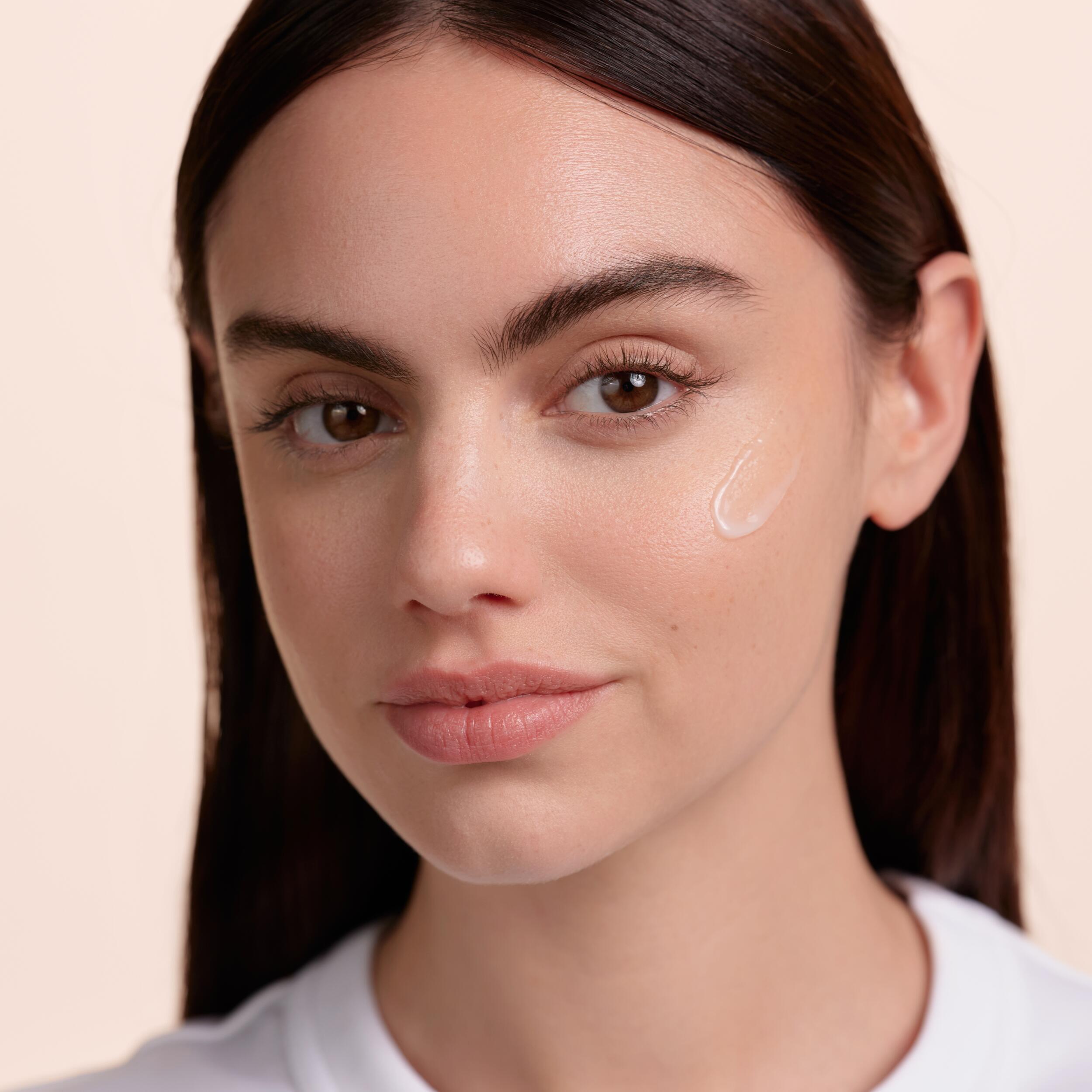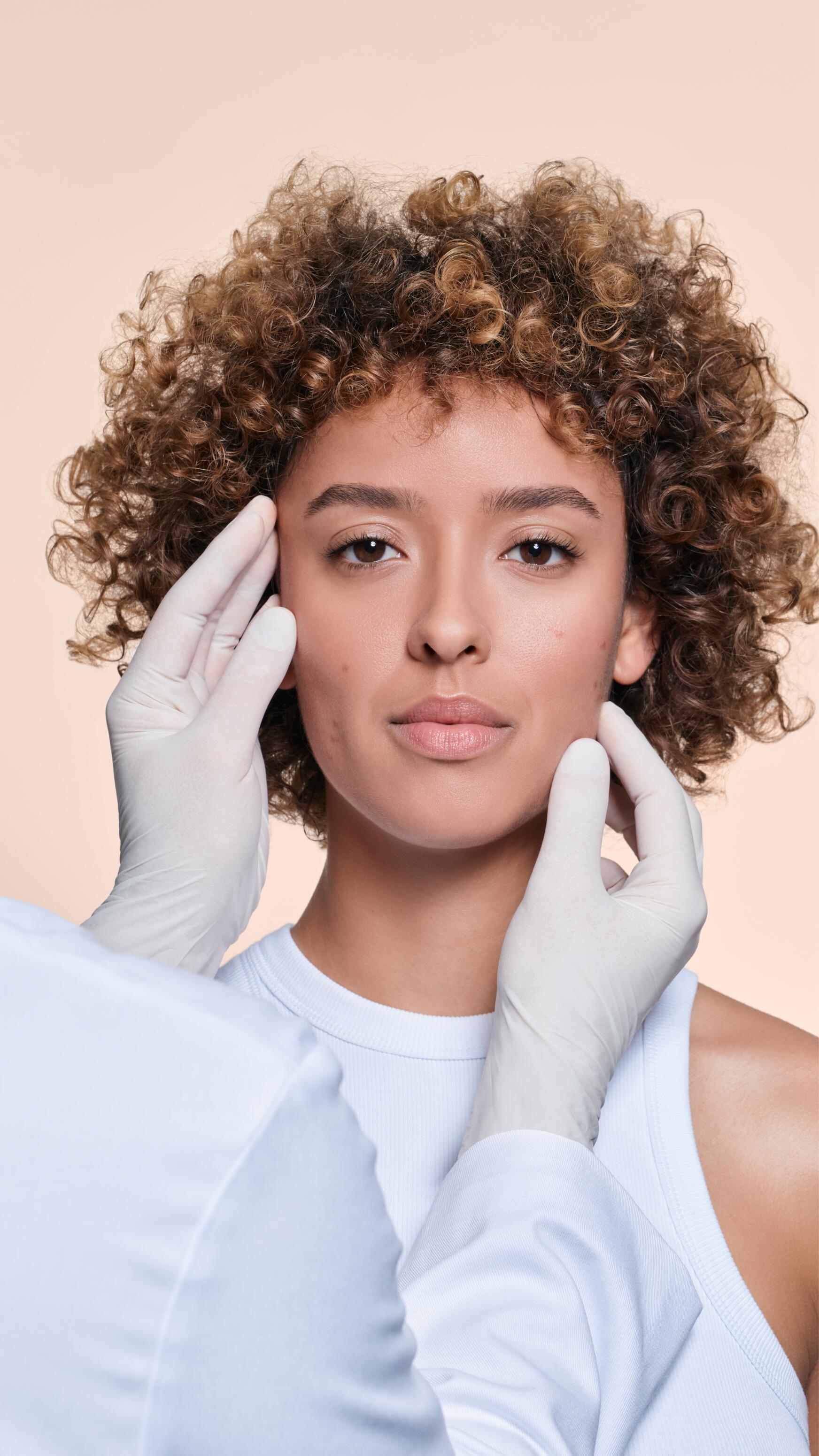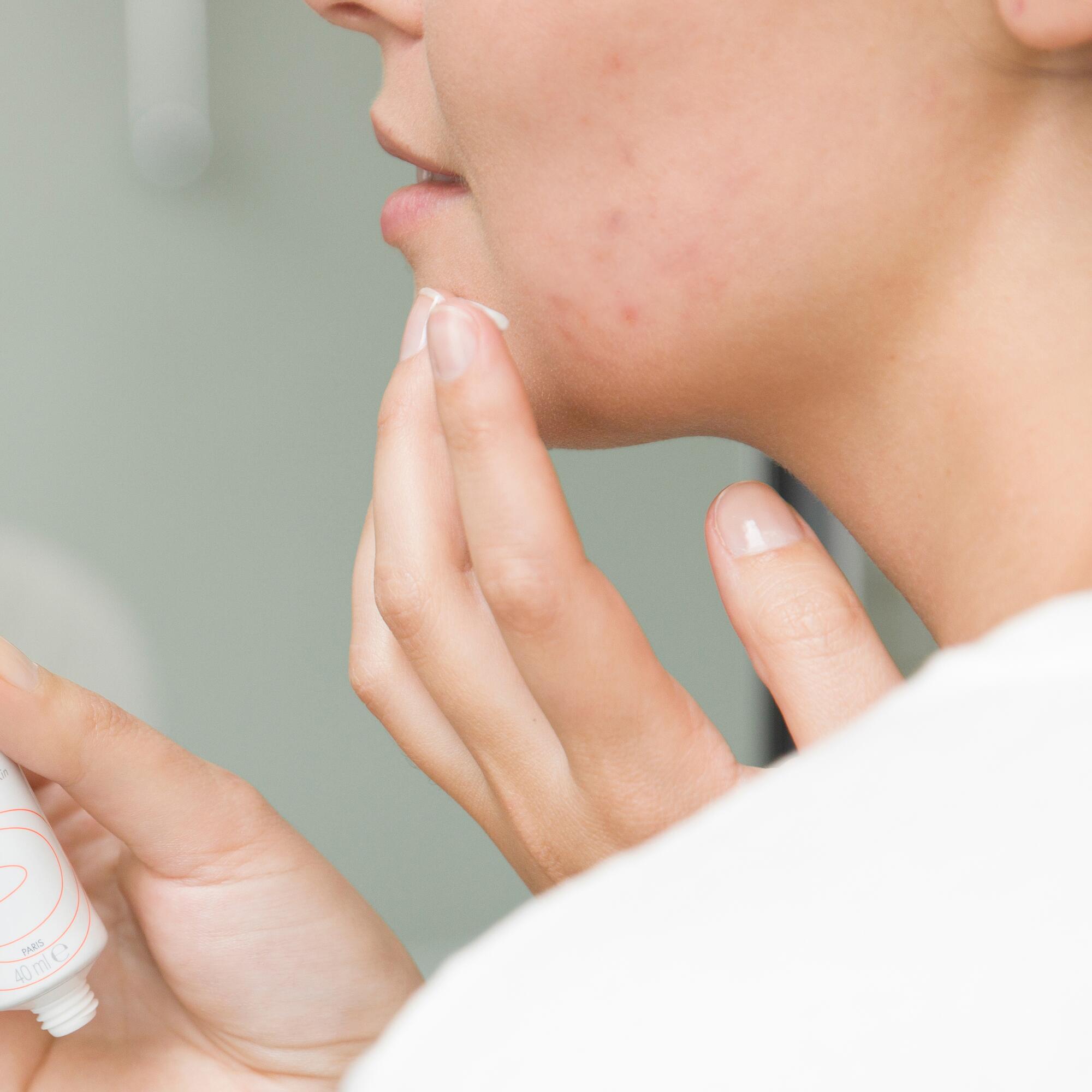Adult acne: identify the causes and treat effectively
Many women and men are surprised to continue or even to start developing acne after the age of 25, and rightly so. However, acne is not exclusive to teenagers and can persist into adulthood. Fortunately, between cosmetic products and dermatological treatments, there are solutions. No, the nightmare is not starting all over again! Let’s take a look at the causes and treatments of adult acne.
What is acne in adults?
Adult acne affects both women and men, although it is more common in women between the ages of 25 and 45. This phenomenon is common, though still rarely talked about. Adult acne can be persistent—a continuation or recurrence of teenage acne—or late onset, meaning it appears for the first time in adulthood, with no significant history during adolescence.


What causes acne in adults?
Genetics and adult acne
The first factor is genetics. If your parents suffered from acne in adulthood, you are more likely to experience it too. This genetic predisposition can influence how your skin reacts to hormonal imbalances and affect both sebum production and skin cell renewal.
Hormones, contraception, and adult acne
If you have acne as an adult, it is important to know that hormonal fluctuations are often the cause. These fluctuations can occur before your period (premenstrual period), during pregnancy, during the menopause, or due to conditions such as polycystic ovary syndrome (PCOS). And that's not all: even your contraception can influence your skin condition. Depending on their composition, certain contraceptives can either worsen or improve acne symptoms. This mainly depends on the type of progestogen contained in the contraceptive. Some progestogens have effects similar to those of testosterone and can worsen acne.
Stress: a potential aggravator of acne
Although stress is not a direct trigger for acne, it can worsen its symptoms. During times of stress, the body produces more cortisol, a hormone that stimulates the sebaceous glands. In addition, stress can lead to scratching, which can cause inflammation, scarring, and hyperpigmentation. The result is an increase in sebum production, which promotes breakouts.
Can your diet influence acne?
The direct link between diet and acne is not clearly established scientifically, but certain foods with a high glycaemic index—such as sweets and refined carbohydrates (e.g., white bread, pastries, soda, etc.)—might aggravate acne in some individuals. However, results can vary from person to person.
Be careful with the cosmetics you use
Sometimes all it takes is the wrong cosmetic product to end up with clogged pores and unexpected breakouts. To avoid this, opt for products labelled “non-comedogenic.” They are specially formulated not to clog pores, helping you maintain clear, healthy skin.
The link between the environment and acne
Did you know that living in the city can increase the risk of developing acne as an adult? Pollution (fine particles, nitrogen dioxide, and ozone) often makes it difficult for our pores to breathe, which can worsen acne. A tailored skincare routine can help protect your skin from these external aggressors.
Whiteheads, blackheads, pustules, or cysts: learn to tell the difference.
How does acne manifest in adults?
While the acne process remains the same (excessive sebum secretion, blockage of the follicular canal, and proliferation of microbial agents), the way it presents in adult women and men differs from juvenile acne.
Differences between men and women: where and how does acne appear?
Adult acne does not manifest in the same way in men and women. Here are the main differences:
In women, acne tends to be concentrated on the lower part of the face, particularly around the jawline and chin—this is known as U-shaped acne. It can also affect the décolletage. Lesions are often inflammatory, including nodules and microcysts on the chin that can cause residual pigmentation and atrophic scars.
In men, acne is generally deeper and more widespread, affecting the back and chest as well as the face. It tends to be more resistant to treatment and may leave more noticeable scars due to the depth of the lesions.
Hormonal, inflammatory, or retention acne: what type of acne do you have?


The psychological impact of adult acne, and solutions
Being affected by acne when you thought it was only teenagers dealt with... This feeling of being thrown back in time, along with the way others look at you, naturally impacts your daily life. Most women and men affected by acne say they feel “stressed”, “frustrated”, or even “embarrassed” by their pimples. Appropriate treatment is therefore essential.
Acne at 30: the psychological impact on adults.
Taking care of your mental health when dealing with adult acne
Acne, especially when it persists and becomes very visible, can seriously affect your mood and self-esteem. It is perfectly normal to feel uncomfortable or embarrassed about your appearance, and in some cases, it can even lead to anxiety or depression. If you find yourself struggling with these feelings, know that you are not alone and that there are ways to support your mental health.
- Consult a professional: A dermatologist is your first line of defence, not only for treating acne, but also for helping you navigate the emotions it brings.
- Seek psychological support: Talking to a therapist can be extremely helpful, especially if acne is affecting your well-being or triggering symptoms of depression.
- Stay informed: Understanding that acne is a common medical condition can help put it into perspective and reduce stress related to appearance.
- Share your experiences: Whether with loved ones or in support groups, sharing what you are going through can ease feelings of isolation and help you cope on a daily basis.
Available treatments for adult acne
Clinical presentation, progression patterns, risk factors... Your acne is different from that of a teenager. Your treatment should be tailored to your needs, as some topical treatments are not always well tolerated. Your dermatologist will be your ally in the quest for an effective solution. They will be able to prescribe the right oral (also known as systemic) or topical (applied to the skin) treatment or certain dermatological procedures such as chemical peels.
Adult acne: how to take care of your skin?
Treatments for adult acne: topical vs systemic
When it comes to treating adult acne, there are two main types of treatment: topical and systemic.
Topical treatments, such as creams, gels and lotions, are applied directly to the skin. These products may contain retinoids or salicylic acid and are designed to reduce inflammation, fight bacteria, and unclog pores.
Systemic treatments, on the other hand, involve taking oral medications that treat acne from the inside by acting on the entire body. These include antibiotics, which fight bacteria and reduce inflammation. Another commonly used medication is isotretinoin, found in treatments such as Accutane or Roaccutane, which are reserved for severe acne that is resistant to other treatments. This medication reduces sebum production and helps unclog pores.
What are the non-medicinal alternatives to treat adult acne?
In addition to medicinal treatments, cleansing your skin twice a day with gentle, non-comedogenic products can also help reduce impurities and excess sebum—two of the main causes of acne breakouts.
Furthermore, light therapy (exposure to specific LED lights), or taking zinc supplements (as part of a balanced diet) have shown encouraging results in treating acne for many individuals.
Non-medicinal treatments and local dermocosmetic creams: what are the differences?
The differences between non-medicinal treatments and dermocosmetic creams mainly lie in their approach and composition:
- Non-medicinal treatments: these methods, often based on lifestyle changes or natural remedies, take a holistic approach to acne by targeting potential underlying causes such as diet or stress. They tend to be less aggressive and have fewer side effects.
- Topical dermocosmetic creams: these contain active ingredients designed to target acne symptoms, such as inflammation and bacteria. Although effective, these creams can sometimes cause side effects such as dryness or skin irritation.

Our acne solutions specially designed for adults
Avène offers a range of products specially formulated to combat adult acne. Here is a complete daily routine to follow if you suffer from acne.
- Cleanance Cleansing Gel: wash your skin with this gel that gently cleanses without drying it out. This product is perfect for daily use, in the morning and evening, to remove excess sebum and impurities.
- Cleanance Comedomed Anti-Blemish Concentrate: after cleansing, apply this concentrate, which targets blackheads and helps prevent them from reappearing by regulating sebum production. This treatment is ideal for daily use on affected areas.
- Cleanance AHA Exfoliating Serum: use this serum to exfoliate the skin and help remove dead cells, promoting a smoother skin texture and reducing imperfections. This serum can be used several times a week, depending on your skin's sensitivity.
- Cleanance Comedomed Peeling Cream: this cream should be used as soon as the first spots appear to deeply exfoliate the skin, refine the texture, and reduce marks and blemishes. It is ideal for night-time care or as an intensive treatment during flare-ups.
- Cleanance Hydra Cream: in case of systemic treatments that tend to dry out the skin, using Cleanance Hydra Cream is recommended. This nourishing and soothing cream is specially formulated for fragile skin, helping restore skin comfort while treating acne.

Skin hygiene and acne: practical tips
Taking care of your skin with the right dermocosmetic products is also essential to treat adult acne. For your daily skincare routine, choose gentle, soap-free products to avoid irritating your skin; moisturising products to compensate for the dryness caused by certain treatments; “non-comedogenic” products to avoid adding new blackheads to your acne... In general, opt for products specifically designed for acne-prone skin.
Acne in adults: how should I care for my skin?
Recommended skincare products for adult acne
Managing acne in adulthood starts with carefully selecting your skincare products. Prioritise:
- Gentle, soap-free facial cleansers: these cleanse the skin without drying or irritating it, maintaining its natural balance.
- Suitable moisturisers: choose light moisturisers that will not weigh the skin down, while still relieving the dryness caused by acne treatments.
- Non-comedogenic products: formulated not to block pores, they reduce the risk of new blackheads.
How to prevent and treat acne scars?
- The first step in preventing acne scars is to resist the urge to touch or squeeze your pimples. Doing so can worsen inflammation and push bacteria deeper into your skin, increasing the risk of scarring.
- Protect your skin from the sun by applying sunscreen with a high SPF.
- Choose treatments that are tailored to your skin type and acne.
- Consult a dermatologist. Microdermabrasion, chemical peels or laser treatment can be effective in reducing acne scars.
What is “maskne” and how can you prevent it?
“Maskne” – or mask acne – is a type of acne that results from frequent face mask wearing, particularly during the COVID-19 pandemic. This type of acne is caused by friction, pressure, as well as moisture and heat trapped under the mask, which can clog pores and cause breakouts. To prevent maskne:
- Choose a soft, breathable, well-fitting fabric mask.
- Wash fabric masks after each use and replace disposable masks regularly.
- Clean your face before and after wearing a mask with a gentle cleanser and apply non-comedogenic skincare products.
- Avoid or limit putting make-up under the mask to minimise the risk of clogging your pores.
What are the effects of acne on non-Caucasian skin?
Acne can affect non-Caucasian skin differently, often with higher risks of hyperpigmentation and keloid scarring. People with darker skin tones may also experience darker spots where acne has healed. To treat and prevent acne on non-Caucasian skin, it is recommended to:
- Use gentle brightening products, such as those containing niacinamide or azelaic acid, to treat hyperpigmentation.
- Avoid excessive sun exposure and protect your skin with sunscreen to prevent dark spots from worsening.
- Consult a dermatologist to receive treatments tailored to your skin’s specific needs.
How to prepare for a medical consultation for adult acne?
- Write down when your acne started, the treatments you have tried, and what seems to worsen or improve your symptoms.
- Bring a list of any medications, creams, and cleansers you are currently using.
- Write down any questions you want to ask so you don't forget anything.
- If possible, bring photos of your skin at different stages to help the dermatologist understand how your acne has progressed.
Our answers to your questions
Separating fact from fiction about adult acne: we're here to help
Make-up can be your best ally if you choose the right products and properly use them. It helps boost self-esteem by providing immediate results, and can help prevent picking at your pimples, which often causes scarring. Choose specific, suitable, non-greasy, non-comedogenic formulas.
Yes, at least for certain types of pills. Some contraceptive pills do help improve acne, while others can make it worse. That's why it is important to talk with your dermatologist, gynaecologist or general practitioner.
It is actually quite common. The hormonal changes that occur at the beginning of pregnancy can cause acne breakouts. Do not worry, though, acne tends to clear up during pregnancy. In the meantime, wash and moisturise your skin with products designed for acne-prone skin. And, of course, protect yourself from the sun's rays.
NEWSLETTER
Always there for your skin!
All our tips for daily skin care

TO FOLLOW
Hvilken hudplejerutine skal du adoptere?
Identificer, hvad din hud virkelig har brug for med hjælp fra vores eksperter og opdag den mest passende hudplejerutine for dig.


